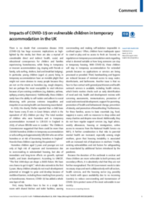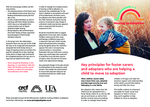Social communication deficits following early‐life deprivation and relation to psychopathology: a randomized clinical trial of foster care
In this study, the authors examined (a) whether institutional rearing is associated with continued social communication (SC) deficits into adolescence; (b) whether early placement into foster care mitigates risk for SC problems; and (c) associations between SC and psychopathology from middle childhood (age 8) to adolescence (age 16).


